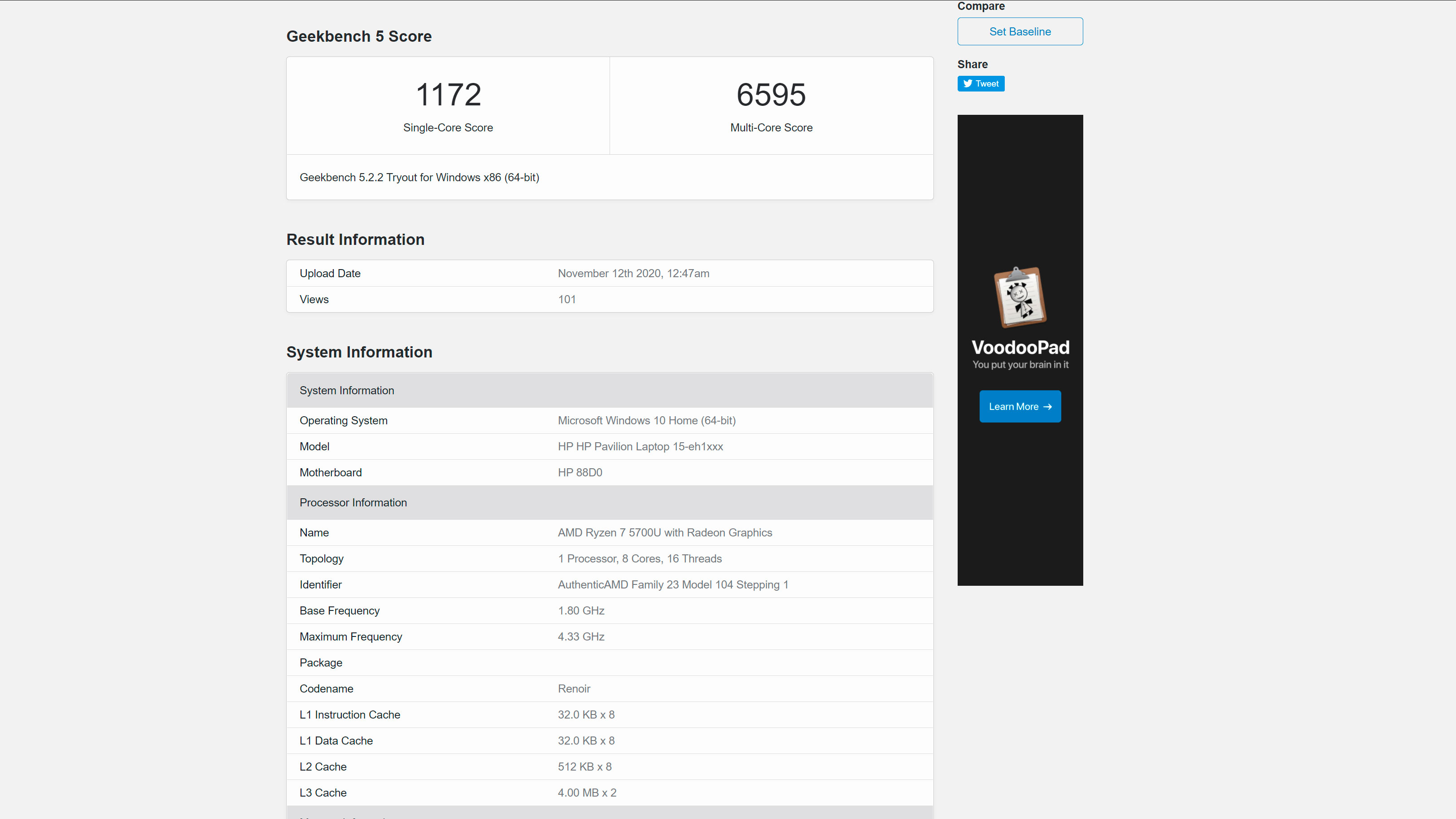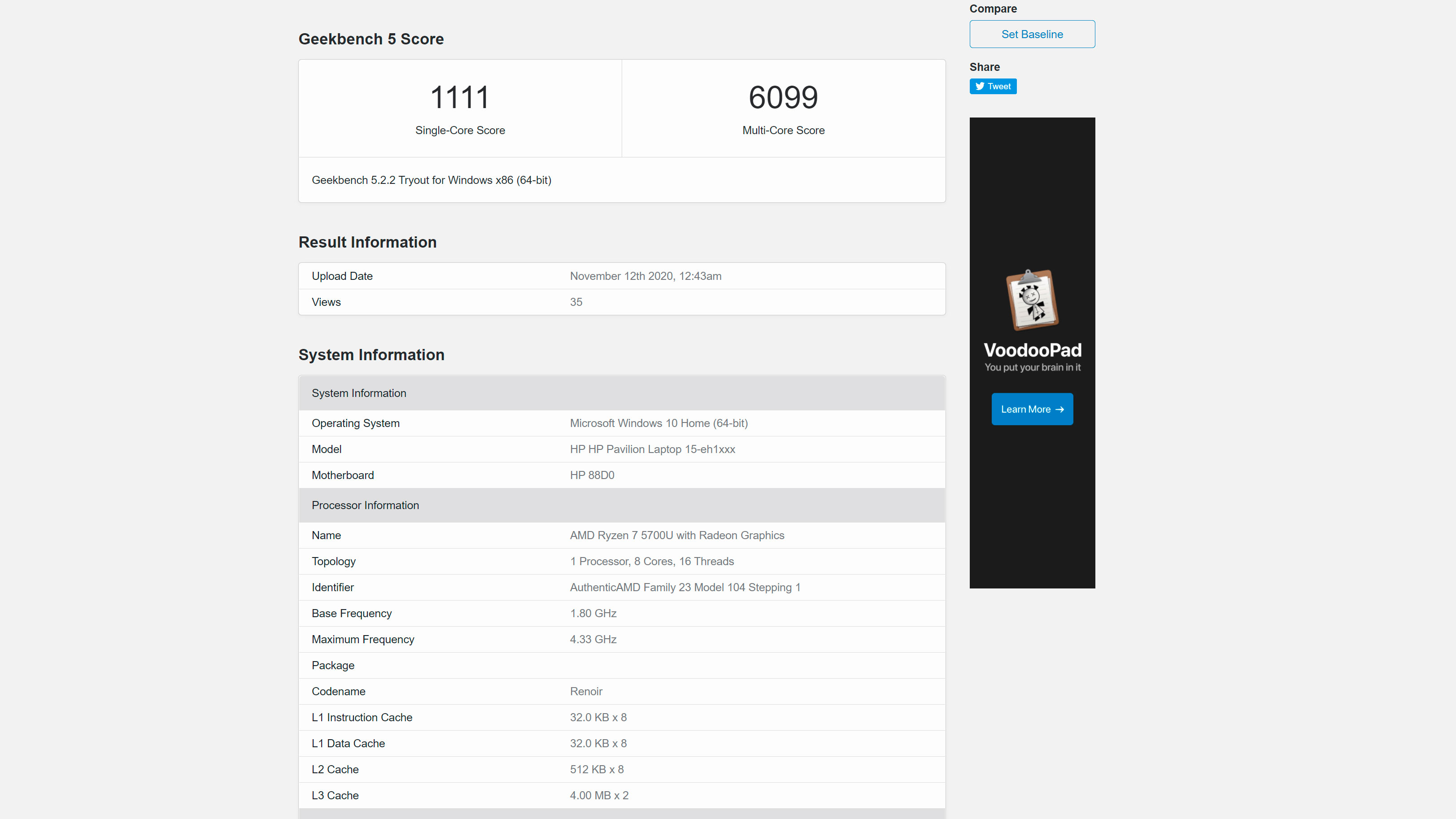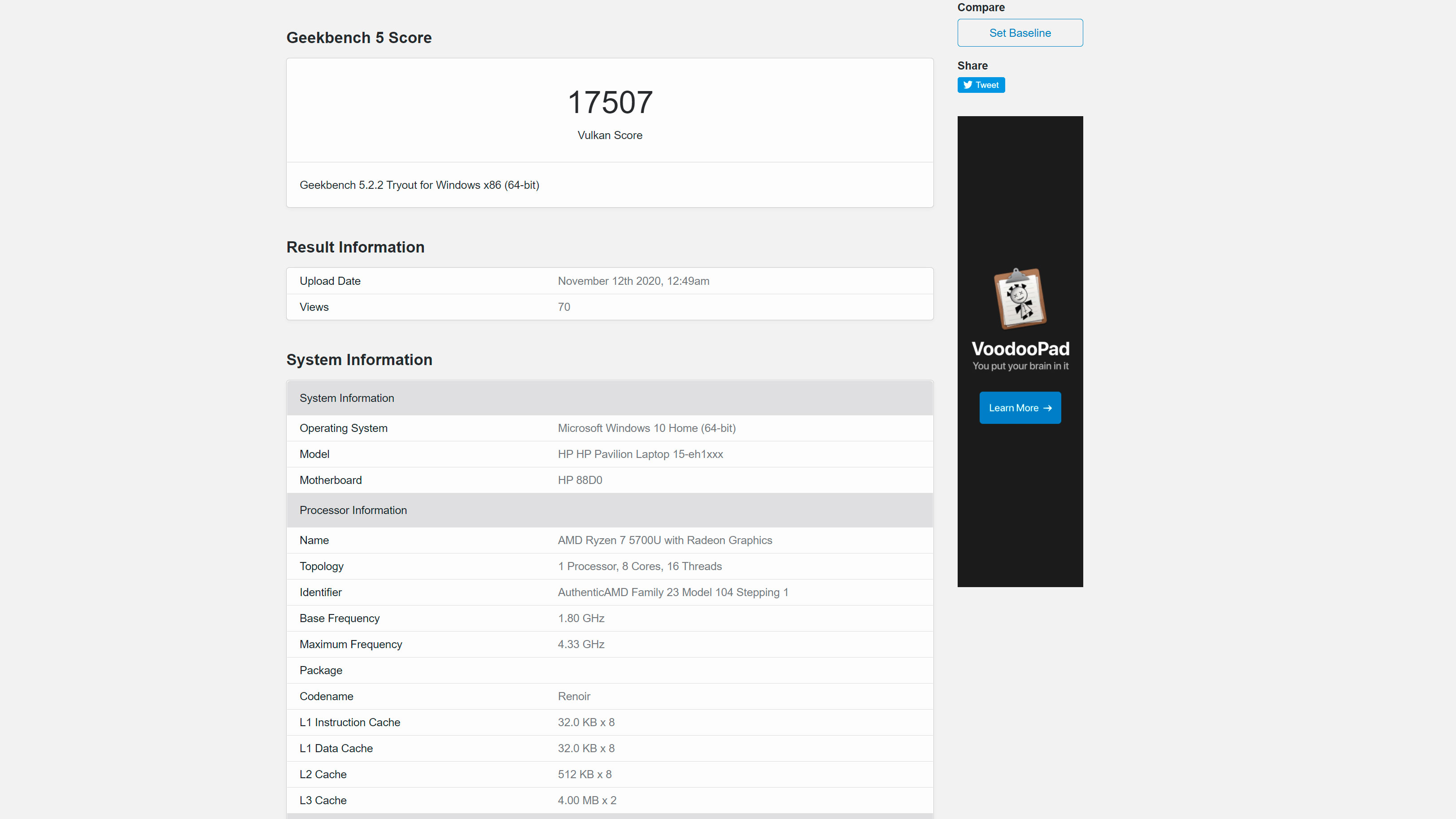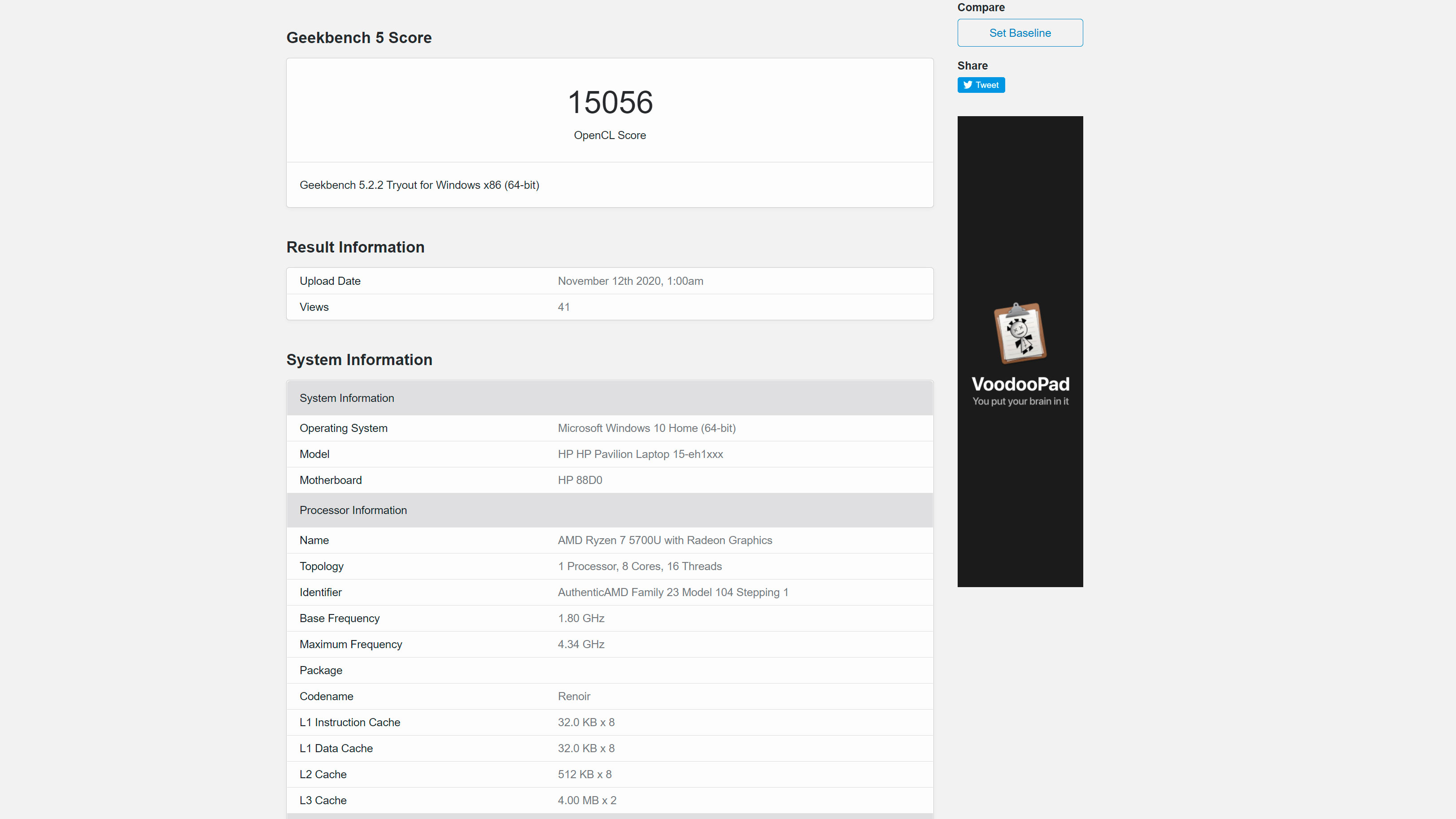AMD's Ryzen 4000 (codename Renoir) mobile APUs haven't even been out for a year yet, and there's already talks of a potential refresh on the horizon. The Ryzen 7 5700U, which reportedly goes by the alias Lucienne, is the first of the Ryzen 5000 APUs to show up in benchmarks.
It's unclear what AMD has in plans for Lucienne or what recipe the chipmaker is using for the Ryzen 5000-series chips. The branding alone is enough to cause confusion with company's recently released Ryzen 5000 (codename Vermeer) desktop processors, which are based on the Zen 3 microarchitecture. Geekbench 5 picks up the Ryzen 7 5700U as Renoir, implying that Lucienne could turn out to be rewarmed Renoir silicon. If that's the case, we're still looking at a combination of Zen 2 cores and Vega graphics.
The Ryzen 7 5700U purportedly checks in with eight cores and 16 threads along with 8MB of L3 cache. You can look at the Ryzen 7 5700U in two ways. You can say it's essentially a Ryzen 7 4700U with simultaneous multithreading (SMT) enabled or a simple rebranded Ryzen 7 4800U. At any rate, it's still a 15W APU that targets mobile devices.
AMD Ryzen 7 5700U Specifications
| Processor | Cores / Threads | Base Clock (GHz) | Boost Clock (GHz) | L3 Cache (MB) | Compute Units | Graphics Frequency |
|---|---|---|---|---|---|---|
| Ryzen 7 5700U | 8 / 16 | 1.8 | 4.3 | 8 | 8 | 1,900 |
| Ryzen 7 4800U | 8 / 16 | 1.8 | 4.2 | 8 | 8 | 1,750 |
| Ryzen 7 4700U | 8 / 8 | 2.0 | 4.1 | 8 | 7 | 1,600 |
*Specifications are unconfirmed.
The Geekbench 5 submissions (via Tum_Apisak) expose the Ryzen 7 5700U with a 1.8 GHz base clock. It's identical to that of the Ryzen 7 4800U, but 200 MHz lower than the Ryzen 7 4700U as a result of SMT. However, the Ryzen 7 5700U beats both Renoir chips when it comes to boost clock speeds. Apparently, the Ryzen 7 5700U can boost to 4.3 GHz, 100 MHz and 200 MHz higher than the Ryzen 7 4800U and Ryzen 7 4700U, respectively.
The optimizations don't just stop at the processor side either. The Ryzen 7 5700U seemingly received an upgrade on the graphics engine as well. The flagship Ryzen 7 4800U features eight Vega Compute Units (CUs) at 1,750 MHz, while the Ryzen 7 5700U's graphic frequency scales to 1,900 MHz. It's just a 8.6% increase, but an improvement nonetheless.




There are only a couple of Ryzen 7 5700U submissions as compared to a ton of Renoir submissions. Therefore, take the results with a grain of salt as the performance uplift is still unclear without a proper review. For the sake of comparison, we'll use the best results for the Ryzen 7 5700U to show the best-case scenario.
Get Tom's Hardware's best news and in-depth reviews, straight to your inbox.
The Ryzen 7 5700U scored 1,172 and 6,595 points in the single-core and multi-core tests, respectively. The aggregated results for the Ryzen 7 4800U display 1,031 points in the single-core test and 5,848 points in the multi-core test. Therefore, the Ryzen 7 5700U offers 13.7% higher single-core performance and 12.8% higher multi-core performance. In regards to the graphics tests, the Ryzen 7 5700U put up OpenCL and Vulkan scores up to 15,065 and 17,507 points, respectively.

Zhiye Liu is a news editor, memory reviewer, and SSD tester at Tom’s Hardware. Although he loves everything that’s hardware, he has a soft spot for CPUs, GPUs, and RAM.
-
MasterMadBones So it definitely has higher IPC than Renoir, judging from the single-threaded score, but it's not as good as Vermeer. Maybe this is some sort of hybrid of Zen 2 and Zen 3?Reply -
digitalgriffin All apu's up to this point have been monolithic. There is a sacrifice if cache because of this. Thats a lot of transistors. We also inow one of zen 3's bug uplift comes from its largr unified cache.Reply
It makes sense. We likely wont see a multichip approach for apu until zen 4 and mcm for navi 3. -
Makaveli Replydigitalgriffin said:All apu's up to this point have been monolithic. There is a sacrifice if cache because of this. Thats a lot of transistors. We also inow one of zen 3's bug uplift comes from its largr unified cache.
It makes sense. We likely wont see a multichip approach for apu until zen 4 and mcm for navi 3.
I agree the 8mb Cache is what is limiting performance. -
ThatMouse There's hardly any Ryzen 7 4800U laptops to actually purchase. Are they even making more or do we wait a year? lol!Reply -
PapaCrazy ReplyThatMouse said:There's hardly any Ryzen 7 4800U laptops to actually purchase. Are they even making more or do we wait a year? lol!
Yes, it seems strange AMD could dominate the entire laptop market yet don't have much of a presence to speak of. Hopefully there will be more options soon. Asus had an exclusivity deal with AMD that was for 6 months. That should expire soon. But it was only for the 4800hs. Which, TBH, is the chip I'm more interested in. Ideally, AMD will release a 5700HS soon with even greater gains over the 4800 and will actually get that chip into a wider variety laptops. -
TCA_ChinChin Still disappointed AMD didn't unify their naming scheme with this move to all 5000 series chips. I'm not denying the value and performance of the new chips, regardless of the underlying architecture, but its still something I find annoying.Reply -
Upacs In the meantime, in our company we are still waiting for delivery of six 4700U laptops, because our supplier cannot get stock. This all seems a bit pointless unless AMD can get more chips out of the factory doors.Reply -
Rdslw Reply
Depends on an hardware picked. I've seen a lot of Asus & HP laptops while others seems to be lacking a bit. I am surprised if your supplier cannot get a specific one you want, did not offer you a replacement.Upacs said:In the meantime, in our company we are still waiting for delivery of six 4700U laptops, because our supplier cannot get stock. This all seems a bit pointless unless AMD can get more chips out of the factory doors.
I still wait for 5800U as laptop I wanted with 4800u was not released in my 3'rd world country. -
shady28 ReplyMasterMadBones said:So it definitely has higher IPC than Renoir, judging from the single-threaded score, but it's not as good as Vermeer. Maybe this is some sort of hybrid of Zen 2 and Zen 3?
Ah, I think it just has higher clocks, not higher IPC. Geekbench 1172 vs 1500+ on Tiger Lake and 1700 on the new Apple M1. So the 5700U is a last gen part with a next gen model number => sneaky marketing. Even the multi-core looks lackluster since TGL gets nearly that with 4 cores. This chip is Zen 2.
Anyway, from what I see AMD needs to focus on delivering a product and stop with the announcements. -
MasterMadBones Reply
But that is exactly the point I'm trying to make. Single core clock speed only increased by 2.4%, while performance went up 13.7%. There must be something else at work here, since we should be able to assume that each APU was able to sustain its single core boost clock throughout the test.shady28 said:Ah, I think it just has higher clocks, not higher IPC.
Tiger Lake (1185G7) has some weird behaviour in this test, showing 22% higher IPC than even the 5700U and a massive 35% more IPC than the 4800U. That is far more than we should expect on average. In AnandTech's SPEC results, Tiger Lake doesn't do this well at all clock-for-clock. Multi-core scores shouldn't even be looked at, because we don't know what TDP the CPUs were running. Intel was very happy to promote Tiger Lake at 28W, so we should expect that the samples that had a 6000 score were running at that TDP.